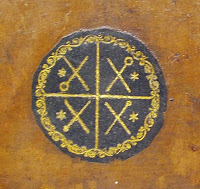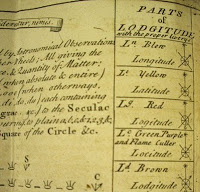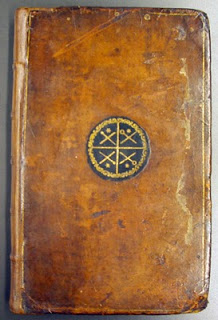Rare Book Cataloger Oksana Linda, who came to the Library in 1998, is particularly fond of this little-known book on longitude by Jane Squire. Bound in calf leather, this volume is beautifully embellished with a centerpiece onlay of black leather, tooled with figures relating to formulae printed in the text. Such elaborate decoration is unusual for such an obscure work, self-published by a female scientist in the 18th century.
Even more intriguing than the binding is the story behind the book itself. In 1714, The British government formed the Commissioners for the Discovery of the Longitude at Sea to encourage innovators to develop an accurate method for measuring longitude.They offered prizes from £10,000 to 20,000 for a working method or device, as well as smaller awards for those making significant contributions or working towards a promising solution. The measurement of longitude, essential to cartography and ocean navigation, was a scientific problem that occupied many of the greatest minds of the day.While early navigators could measure latitude with reasonable accuracy, there was no reliable method for determining longitude on long sea-voyages. Errors in navigation could result in several weeks’ delay, starvation, or shipwreck. France, Spain, and Holland also offered prizes for longitude solutions.
 Jane Squire (1671-1743) was the only woman to try for the prize. In 1731 she published an 11-page pamphlet, “A proposal to determine our longitude” and submitted it to the commissioners of the British longitude prize. Despite her persistence, her proposal did not gain acceptance. Her 1742 book, A proposal for discovering our longitude, further elaborated on her theory and struggles to promote it. With parallel texts in English and French, the book included her original pamphlet, copies of letters written and received regarding her proposal, and a complex explanation of the unique system she developed for measurements. The Clements Library holds a copy of the second edition of this work, printed in English in 1743 and titled A proposal to determine our longitude.
Jane Squire (1671-1743) was the only woman to try for the prize. In 1731 she published an 11-page pamphlet, “A proposal to determine our longitude” and submitted it to the commissioners of the British longitude prize. Despite her persistence, her proposal did not gain acceptance. Her 1742 book, A proposal for discovering our longitude, further elaborated on her theory and struggles to promote it. With parallel texts in English and French, the book included her original pamphlet, copies of letters written and received regarding her proposal, and a complex explanation of the unique system she developed for measurements. The Clements Library holds a copy of the second edition of this work, printed in English in 1743 and titled A proposal to determine our longitude.
Jane Squire’s scientific approach was unusual, to say the least. Rejecting the traditional approaches, she proposed a new system of dividing the globe into a million “cloves,” each with its own “zenithal” star to calculate astral and local time. She developed her own terminology and measurements, and used a prime meridian based on the city of Bethlehem. Indeed, it is not surprising that her ideas were dismissed by the commissioners and contemporary scientists. An analysis printed in The Observatory in 1915 concluded, “The central idea of the proposal is rooted in a remarkable confusion of thought.”
 Despite serious flaws in her proposal for determining longitude, Squire valiantly asserted her right to compete along with the other scientists of her day. Against the objection that “Mathematicks are not the proper Study of Women,” Squire asserted that “to count, to measure, &c. which are now generally suppos’d to be included in [Mathematics]; are so naturally, the Properties of every reasonable Creature, that it is impossible to renounce them.”
Despite serious flaws in her proposal for determining longitude, Squire valiantly asserted her right to compete along with the other scientists of her day. Against the objection that “Mathematicks are not the proper Study of Women,” Squire asserted that “to count, to measure, &c. which are now generally suppos’d to be included in [Mathematics]; are so naturally, the Properties of every reasonable Creature, that it is impossible to renounce them.”
Squire continued, “Hence, Sir, it has ever appeared to me ; that to study the Law of God Day and Night, is my proper Business ; Philosophy, my Amusement ; and Mathematicks, my Play-things. . . . I do not remember any Play-thing, that does not appear to me a mathematical model ; nor any mathematical Instrument, that does not appear to me a Play-thing : I see not, therefore, why I should confine myself to Needles, Cards, and Dice.” Regarding her right to seek the prize, she declared that it appeared to her “as fair a Prize, as any Plate given to be run for at Newmarket or elsewhere ; the Pursuit more entertaining, the Victory more glorious, and the Attempt free to all.”
Jane Squire must have been a remarkable woman, and yet little is known of her beyond her published works. A brief biographical entry in The feminist companion to literature in English summarized her proposal and notes that “the scholar Thomas Rawlins admired her.” Rawlins’ letter to George Ballard in 1743 indicated a deep respect for her character and work:
“Mrs. Jane Squire author of ye Treatise very lately published for determining ye Longitude. She was a Lady excellently well versed in Astronomy, Philosophy, & most pts of polite Literature. She had a most moral Life. She dyed April 4th. 1743 wth. a just Resignation to ye Will of God (a Roman Catholick) & in a firm Hope of Salvation. It is a great Loss to Navigators yt she has not lived to finish her Catalogue of Stars, describing their Longitude, Latitude & Place in both Hemispheres, in a manner entirely new, & more certain than any ever done before.” [Letter reprinted in the edited edition of Ballard’s Memoirs of several ladies of Great Britain, 1985]

